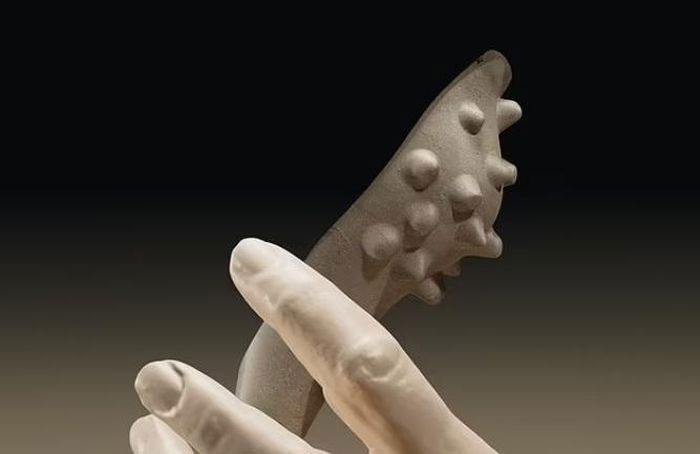American Researchers Design Spoon That Makes Food Taste Sweeter Without Adding Sugar.
This innovative spoon is currently in the initial design phase. It features protrusions on its underside to increase the surface area that physically interacts with the taste buds on our tongues. Importantly, these protrusions will be coated with a molecule known as a ligand.
Ligands are chemical substances that interact with specific receptors on cells to trigger physiological responses. They have shapes and characteristics that allow them to engage with a particular receptor, much like pieces of a puzzle. In this case, the researchers stated that the ligand is derived from sugar and adheres to the spoon.

Design of the Sugarware Spoon. (Photo: Daily Mail).
As a result, the spoon will stimulate the sweet taste receptors in our taste buds without us actually consuming any sugar.
Mrs. Carl May from the University of Bristol (UK), who is not involved in the project, commented: “This is a brilliant idea. This spoon will trick our brains into thinking we are eating something sweet. After all, the tongue can detect sugar, but the ‘sugar’—meaning the ligand—is attached to the spoon, not in the food we eat.”
The American researchers have named this spoon Sugarware, and they recently won an award at the Biodesign Sprint 2022 competition for innovative ideas in biotechnology.
Student Carolyn Chiu from the University of California (USA), who is part of the Sugarware design team, stated that the target audience for this spoon includes diabetics or those looking to reduce their sugar intake.
Carolyn Chiu emphasized that artificial sweeteners can negatively impact the gut microbiome: “So we thought that if we don’t consume any sugar, including artificial sweeteners, we could address this issue.”
Professor Havovi Chichger from Anglia Ruskin University (UK) led a 2021 study examining the effects of three common sweeteners—sucralose, aspartame, and saccharin—on human gut cells in the lab. The results indicated that these sweeteners promote the growth of certain harmful bacteria.
She stated: “Sweeteners make two common types of gut bacteria more likely to invade and destroy our gut cells. This means that our gut barrier is compromised, leading to increased bacteria in the bloodstream. The concern is that after many years of consuming sweeteners, low-grade inflammation can easily occur.”
Mrs. Havovi Chichger added: “Ideally, we should try to reduce our consumption of artificial sweeteners and be aware that they have an impact, but for us, these sweeteners may indeed be better than consuming high amounts of sugar.”
Sugarware remains in the early development stage, with a crucial focus on finding ways to ensure the ligand adheres longer to the spoon.
Last year, a pair of chopsticks designed to make food taste saltier was produced in Japan to help people reduce their salt intake. Researchers at Meiji University (Japan) utilized a weak electric current to transfer sodium ions from the food through the chopsticks to the user’s mouth, where they create a salty sensation.




















































